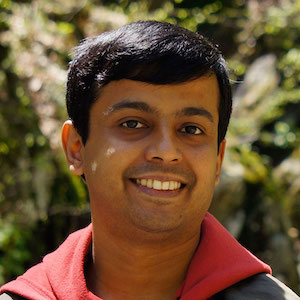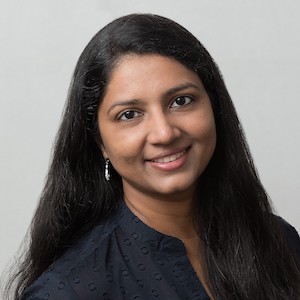Graduates of the Science Communication Master's Program at UCSC have a long tradition of contributing to their professional community through regional and national volunteer service. This year, that slug ethos has reached a high-water mark: The program's alumni now compose a majority of the board of directors of the National Association of Science Writers.
The board's newly elected slate of 15 members includes eight SciCom graduates, led by two members of the executive board: President Sandeep Ravindran, class of 2011, and treasurer Jyoti Madhusoodanan, class of 2014. They will serve in these roles through fall 2026.
"NASW has been a huge part of my science writing journey right from the start," says Ravindran, a freelance journalist based in the Washington D.C. area. "I am grateful for the privilege of leading this organization."
This is Ravindran's fourth term on the association's executive board; he has served previous two-year stints as treasurer, secretary and vice president. He trained as a journalist in Santa Cruz after earning his Ph.D. in microbiology and immunology at Stanford University. Ravindran now covers life sciences and technology research for a wide range of national publications, including The New York Times, Nature, National Geographic, and TIME, and he is a lecturer in the Johns Hopkins M.A. in Science Writing program. He also mentors new journalists through several national networks.
"As a SciCom student, I saw that most of my professors were active volunteers in NASW committees and leadership positions, as were many SciCom alumni," Ravindran says. "I remember being inspired by their desire to give back to the community. I very much appreciate any program that inculcates that spirit of volunteerism into its students."
Madhusoodanan, a freelance journalist based in Portland, Ore., is now in her third term on NASW's executive board, having served most recently as secretary. She earned her Ph.D. in biomedical sciences at the State University of New York, Buffalo, before enrolling in the SciCom program. Madhusoodanan is a senior contributor at Undark magazine, published by MIT's Knight Science Journalism Program, and a Civic Science Fellow at the Association of Health Care Journalists, focusing on racial bias in health research. She also contributes to The New York Times, NPR, Nature, Discover, and other publications.
In October, the South Asian Journalists Association honored Madhusoodanan with its "Outstanding Range of Work Award" for three stories she published in 2023 on inequities in healthcare: "Why Cancer Treatments Might Not Work Very Well for Older Adults" in Undark; and two articles in Scientific American, "Discrimination May Hasten Menopause in Black and Hispanic Women" and "Fixing Air Pollution Could Dramatically Improve Health Disparities."
Six graduates of the SciCom program are now serving as at-large members of the NASW board:
• Amanda Heidt, class of 2020, freelance journalist based in Moab, Utah.
• Alla Katsnelson, class of 2007, freelance journalist based in Northampton, Mass.
• Rodrigo Pérez Ortega, class of 2019, diversity in STEM staff writer for Science, based in Mexico City.
• Ariana Remmel, class of 2020, freelance journalist and audio producer, based in Little Rock, Ark.
• Priyanka Runwal, class of 2019, associate editor at Chemical & Engineering News, based in New York City.
• Ramin Skibba, class of 2016, freelance journalist and former space reporter, WIRED, based in Oakland.
The National Association of Science Writers includes more than 2,000 journalists, authors, public information officers, students and others who inform the public about science, health, engineering and technology. The organization promotes press freedom and improves access to information related to science and scientific research. NASW supports students and its diverse membership through mentoring programs, career development grants, online resources, and travel fellowships to its annual conference—scheduled this year for November 8-11 in Raleigh, North Carolina.
Majority of national science writers' board composed of SciCom alumni
Eight of the 15 new board members of the National Association of Science Writers are graduates of UCSC's Science Communication M.S. Program.
October 18, 2024
By Robert Irion


